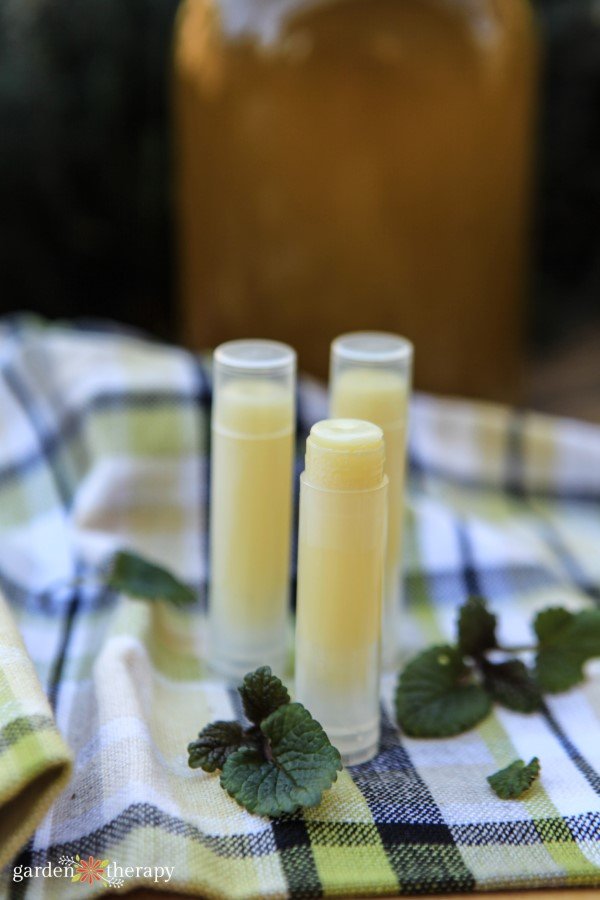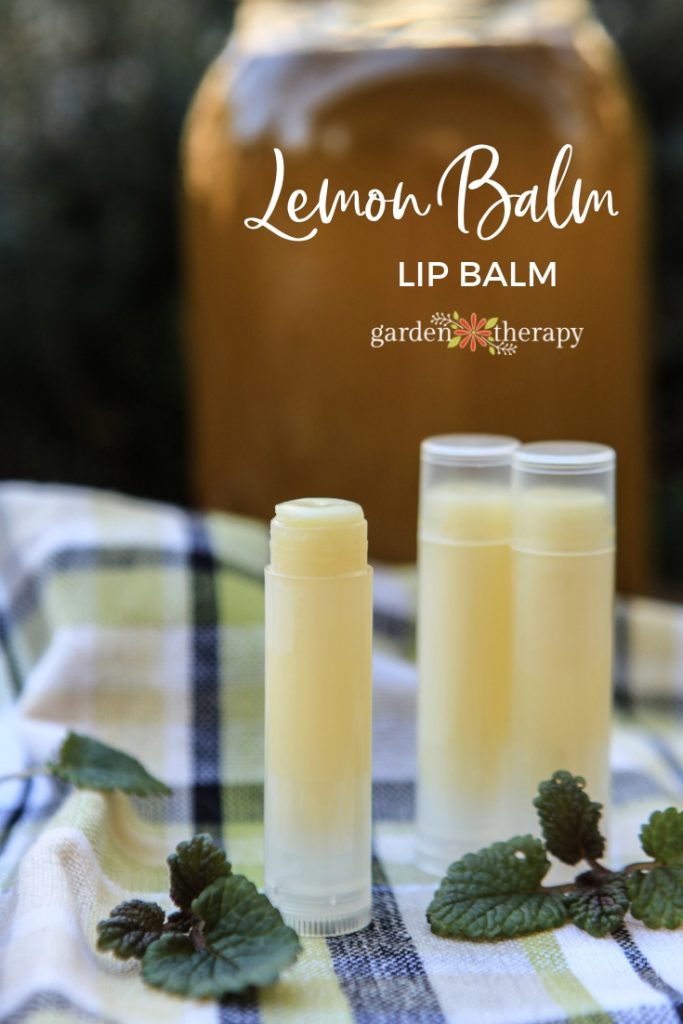Lemon balm’s antiviral properties make it a popular herb for the treatment of cold sores, chicken pox, bug bites, and other little red spots. This recipe for lemon balm lip balm not only has a bright and cheery lemon fragrance, but it also is a great way to prevent and treat cold sores.

Lemon balm is the herb for little red spots. It makes a fresh and delicious tea and grows like crazy in the garden, but in herb circles, it’s known for so much more.
This powerful and plentiful herb is one of the best ways to treat AND prevent cold sores from happening. I use it year round, helping to stop the annoying red dots from popping up. And as a bonus, I have a use for all the lemon balm that never stops popping up in the garden.
Making your own lip balm is quite easy, and infusing it with lemon balm is also a simple process. Here’s how you can make your own lemon balm lip balm for cold sores.
Get to Know Lemon balm (Melissa officinalis)
When I first started gardening I used to pull out lemon balm by the handfuls and throw it into the compost bin. While I love the fresh, bright, lemony smell and the pretty mint-like leaves, it grows like crazy and seems to be in every spot of the garden. Now, that I’ve mostly cleared it out of all the spaces where it was growing naturalized I can’t help but wonder
“What the heck was I doing!”
That wonderful lemon balm has so many uses! And so now I start lemon balm from seed, place it in the garden, and happily harvest any extras that might pop up.
Lemon balm (Melissa officinalis) essential oil is one of the most expensive essential oils you can buy. Because of its price point, it’s not very commonly used in aromatherapy. But it’s also reserved because it is incredibly powerful in strong concentrations (like you’ll find an essential oil).
It is more common to see herbal preparations as tea, honey, and infused oil for the home herb lover. I love it as a herbal infusion in skin care products, as a powerful cleaner, and skip the essential oil altogether.
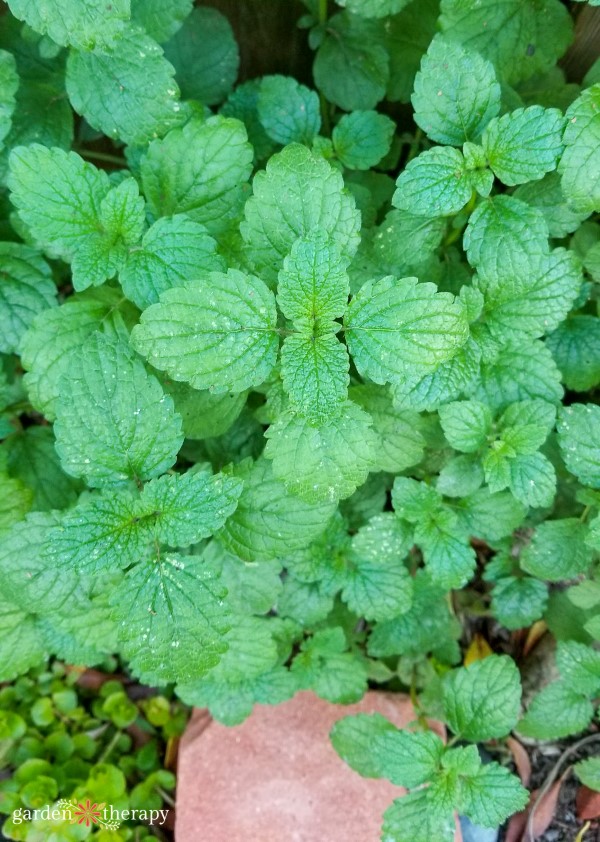

Herbal Benefits of Lemon Balm
Lemon balm is used as a calming herb that soothes anxiety and helps to tone the nervous system. Not to be confused with herbs like chamomile and hops that help to promote sleep and rest, lemon balm is calming but also uplifting.
It helps to reduce anxiety and depression symptoms and lift spirits. Perhaps this is also how it helps its cold sores, which are caused by stress. It’s antiviral properties mean it also helps to prevent more cold sores from popping up.
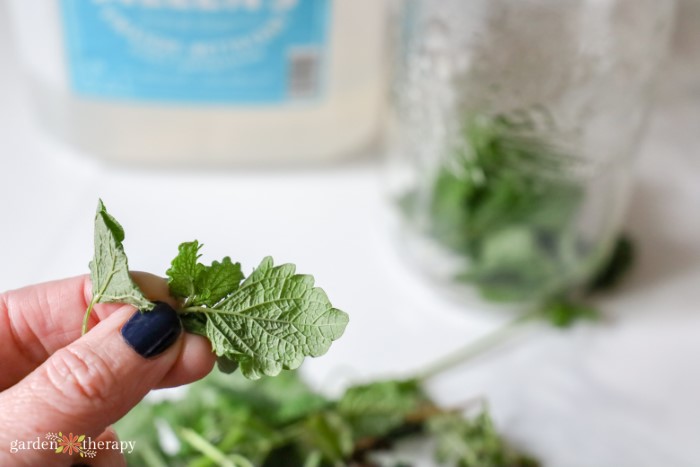

Cold Sores (Ugh.)
Cold sores on the face are caused by the Herpes Simplex 1 virus (HSV-1). I got this delightful gift from my mom, and I try pretty darn hard not to pass it on to my kiddo. Cold sores are a real bumme; they hurt and itch, and it feelsl like you have a painful watermelon growing on your face for everyone in the whole world to see.
And they have the delightful habit of popping up when you are sick, on vacation, getting photos taken, or hosting an event. Which makes sense, because the virus lies dormant in our body until it is triggered by stress or a reduced immune system.
They are called cold sores because they usually accompany a lower immune system caused by the common cold, but for me, they’re actually more frequent in times of stress, both emotional and physical.
When I’m feeling stressed and run down, I’ll inevitably pop up a cold sore on my lip. Or if I go out into the sun without wearing sunscreen lip balm. Usually it’s after a period of no sun exposure, and then a sudden change to direct sun on my face like a sunny skiing day, a tropical winter vacation, or the beginning of the summer at home.
This is why I now always have a supply of lemon balm lip balm for cold sores when they show their ugly faces.
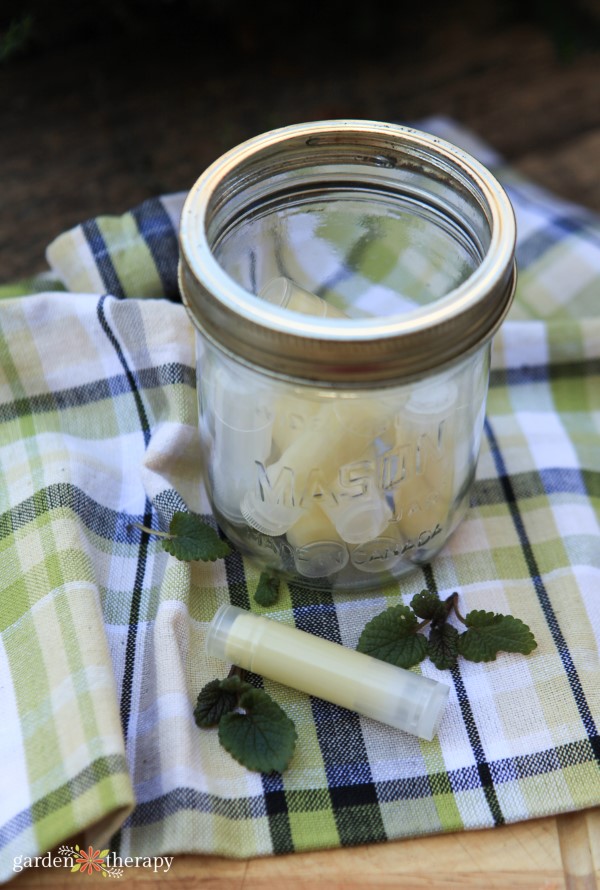

Harvesting Lemon Balm for Infused Oil
The best time to harvest lemon balm is before flowering. This is when most of the volatile oils are available in the leaves and stems. Pinching back the plant by a third will also increase its robustness and fullness.
You can happily harvest a bunch of fresh green lemon balm leaves from the top third of the plant and the rest of the plant will be quite happy and grow back denser and sturdier.
Be sure to only harvest and use healthy-looking green leaves. Any decay, brown spots or powdery mildew is not something that you want to add into infused oils. Add the cuttings into a salad spinner and rinse well with water. Then spin to remove all topical water.
Lay the lemon balm out on herb drying screen and allow it to wilt for 24 hours. Lemon balm doesn’t usually have any pests but if there are any, this will give them a chance to go find a new home. More importantly, it allows a lot of the water to release.
In most cases, I strongly recommend that herbs are dried prior to infusing them into oil because when water is introduced to an oil infusion, it can also introduce bacteria and mould growth.
In this case, lemon balm infusions are much more effective using the fresh leaves. Lemon balm studies have shown some antibacterial properties, and some sources report antifungal properties as well, both of which will help to keep the oil from growing bacteria and fungus.
Even so, if I’m using the fresh herbs I’m sure to make it in small batches and use it up quickly, within 4 to 6 weeks. Additionally, if you notice any discoloration, sediment, or indication of mould or fungus, discontinue use immediately.
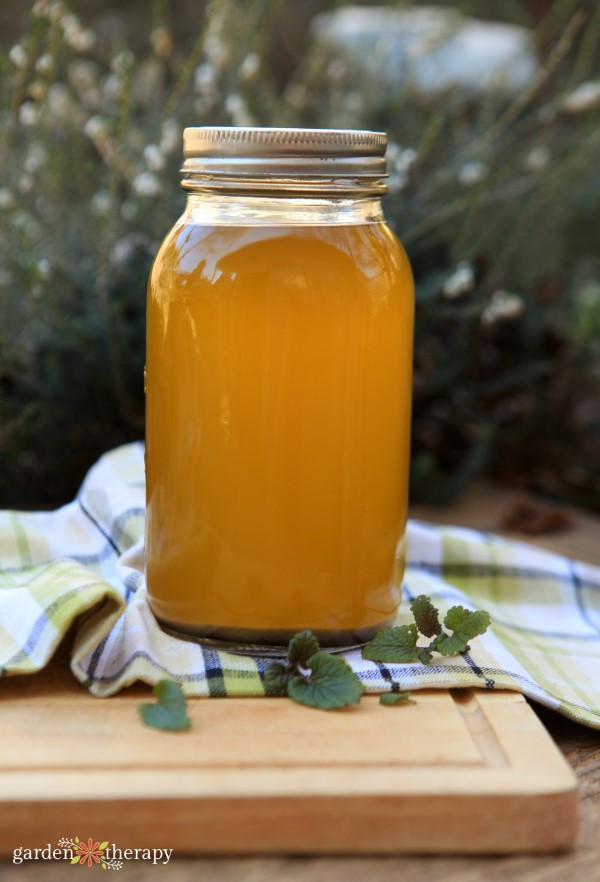

Lemon Balm Lip Balm for Cold Sores
Because we are using the fresh herb I recommend using a heat infusion method, rather than cold infusion which will take 4 to 6 weeks and itself. See how to do the heat infusion in this post: Three Ways to Make Herbal Oils for Natural Beauty Recipes.
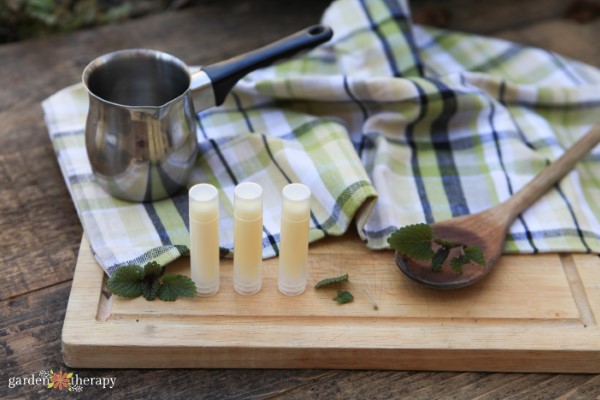

Materials
Ingredients
See exact measurements in recipe card below.
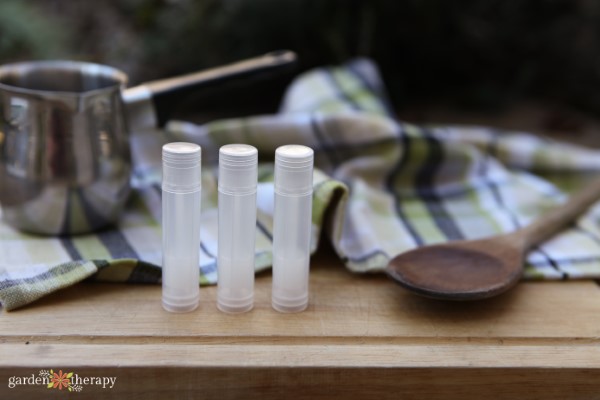

Make it!
Melt the wax, over medium-low heat in a Turkish coffee pot, double boiler, or a small pot with a pour spout. Add the oils and butter when the wax is liquefied and melt all of the ingredients together.
Stir constantly and keep a watchful eye on the oils. You want them to just reach the melting point and not overheat.
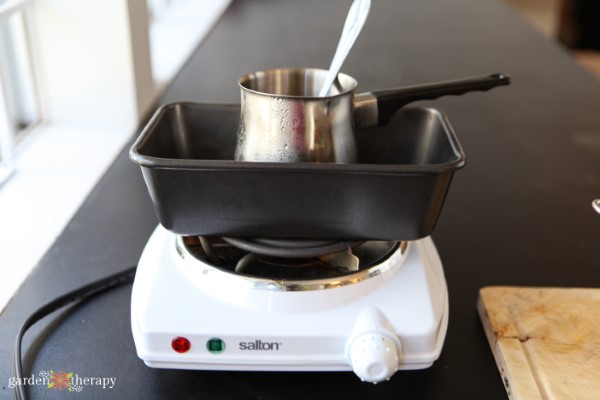

Fill each tube halfway full and let cool slightly. This will set the bottom of the tube so that a hole doesn’t form in the top of the lip balm when cooled.
Before the tubes are starting to set, fill the rest of the way, so there is a convex curve on the top (be careful not to spill over the edges). When the lip balm cools, it will shrink so it should end up having a flat top. If you need to even out the top, a heat gun works really well.
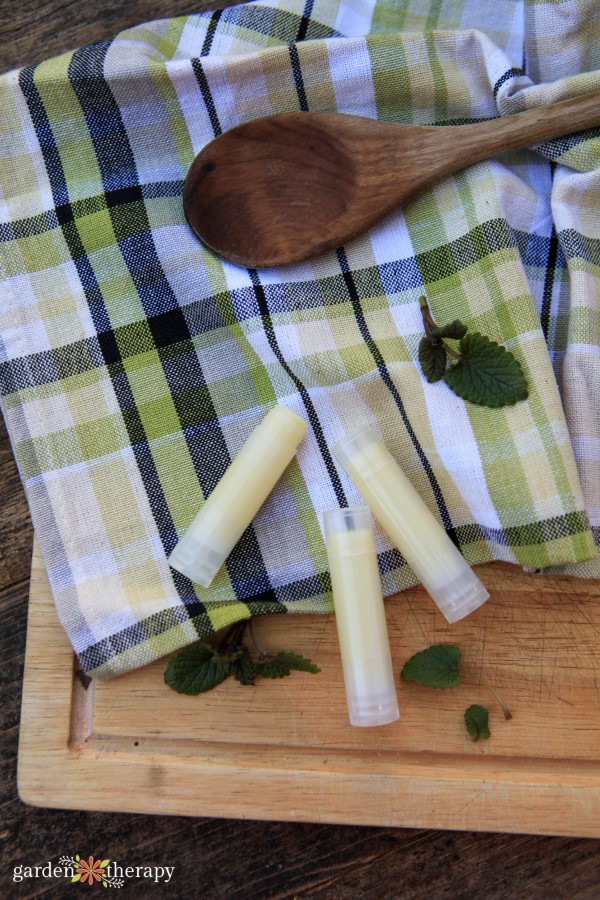

FAQ About Lemon Balm Lip Balm
A petroleum jelly lip balm like Vaseline can moisturize a cold sore and help ease the discomfort and pain that can come from it. However, it won’t actually heal the cold sore. Lemon balm has antiviral properties that can help prevent cold sores and the calming nature of the herb reduces the stress that causes them.
Most of the time, the virus (HSV-1) lies dormant until something triggers it. This can include stress, fatigue, being on your period, exposure to strong sunlight, an injury in the affected area, and having another infection.
Lip balm helps to keep the area moisturized and prevent the sore from drying out and cracking. But once you use a lip balm on a cold sore, it is contaminated. Dispose of the lip balm after the cold sore heals.


Lemon Balm Lip Balm
This lemon balm-infused lip balm is ideal for treating and preventing cold sores.
- 8 g extra virgin coconut oil
- 12 g lemon balm infused organic grapeseed oil
- 6 g beeswax
- 4 g raw cocoa butter
-
Melt the wax over medium-low in a small pot with a spout.
-
Once the wax is melted, add in the oils and butters.
-
Keep stirring. Let the combination just reach the melting point, but don’t let them overheat.
-
Fill your lip balm tubes halfway and let cool slightly. This stops a hole from forming in the middle.
-
Once starting to set, fill the tubes the rest of the way until there is a convex curve on top. This should shrink once cooled into a flat top.
More Herb-Infused Recipes for Healing Skin Care

